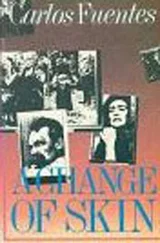Ideas are never fully realized. At times they retract, hibernating like some beasts do, waiting for the most opportune moment to reappear. Thought does not die. It only bides its time. The idea that seems dead in one time reappears in another. The spirit does not die. It moves. It duplicates. Sometimes it supplants, and even supplicates. Disappeared, it is believed to be dead. It reappears. In reality, the spirit announces its presence in every word we utter. There is not a single word that is not infused with memory and forgotten thoughts, imbued with dreams and failures. And nevertheless, there is not a single world that cannot conquer Death because there is not a single word that is not the carrier of imminent renewal. The word fights Death because it is inseparable from it — stealing it, announcing it, inheriting it. . There is not a single word that is not the bearer of imminent resurrection. Every word we utter simultaneously announces another word that we do not yet know because we have forgotten it and another word we do not know because we desire it. The same thing happens with bodies, which are matter. All matter contains the aura of what it was before as well as the aura of what it will be after it vanishes. For that reason we live in an age that is ours, but we are also the ghosts of an older age, as well as the foreshadowing of an age that is yet to come. Let us not lose sight of these promises that Death holds.
Education has come to be the basis for productivity. As we enter the twenty-first century one thing is clear: economic growth depends on quality of information and this, in turn, depends on quality of education. The most privileged positions in our modern economy are occupied by those who create and produce information rather than tangible products. Film, television, music, and the telecommunications industries, as well as manufacturers of equipment and technology for information processing, are at the center of global economic activity today. Years ago, the wealthy amassed their fortunes in things like steel (Carnegie, Krupp, Manchester). Today, however, the wealthy make software equipment (Bill Gates, Sony, Silicon Valley). This is a basic truth that can and should be contrasted with certain facts. The depths of poverty found in the countries of the so-called Third World have resulted in decreasing education levels. There are 900 million illiterate adults in the world, 130 million children who do not attend school, and 100 million children who stop attending school during the primary years. The countries of the Southern Hemisphere contain 60 percent of the world’s student population but control only 12 percent of the world’s budget for education. In Mexico, the average level of schooling is six and a half years. In Argentina it is nine, and in Canada, twelve. At high school and college preparatory levels, only twenty-eight of every 100 teenagers between the ages of sixteen and eighteen receive any kind of schooling in Mexico, and at the universities only 14 percent of those between nineteen and twenty-four actually earn their degrees. At the graduate level, only 2 percent of enrolled students earn master’s degrees, and only 0.1 percent reach Ph.D. level. Only 6 percent of the world’s scientists come from the Third World. Of this figure, only 1 percent are Latin American. Ninety-five percent of all scientists come from the First World.
The right to education, as Nadine Gordimer says, is as basic as the human right to air and water. Every year the world spends 800 billion dollars on armaments but cannot seem to put together the 6 billion dollars annually necessary to place all the children of the world in school by the year 2010. “A reduction of as little as 1 percent in military spending, throughout the world, would be sufficient to get all the children in the world in front of a blackboard” (information provided by UNESCO and the World Bank). The cost of one warplane for the air force of a Latin American country would be enough to pay for 80 million school-books.
Exclusion from the educational system is the cause of inequality in Latin America. Political stability, democratic achievements, and economic well-being will not be sustainable if the population does not gain increased access to education. Can progress be possible if only 50 percent of all Latin Americans who enter school are able to graduate? Can progress be possible when a Latin American schoolteacher earns only $4,000 a year while his or her counterpart in Germany or Japan earns $50,000?
Solutions. Strengthen educational yield, the chain of steps that can bridge the dramatic gap that currently exists between the most basic level of education and education for technology and the information industries. Strengthen the teaching profession. The Latin American schoolteacher cannot be expected to expend more energy and assume more responsibility when salary scales continue to wane and professional tools are increasingly harder to obtain. The future of Latin America becomes brighter every time teachers receive better training, when their status improves and their social presence is strengthened. Moreover, in the accelerated but still difficult process of democratization in our countries, teachers have the right — as do all citizens — to participate in politics, but they are also bound by a higher obligation: that of using the classroom as a forum for broadening the concept of politicization. This is something that goes beyond partisan militancy, and it is achieved not through abdication or lies, but through the understanding that school is where the concept of politicization can begin. School is where this concept can move from the notion of “power over the people” to “power with the people.” In today’s world, the broadening of democracy in school means understanding what power is in the first place— how it gets distributed among individuals, groups, and communities and how resources are allotted in wealthy countries inhabited by millions of people living in poverty. School is where people may learn that civic militancy is not limited to political parties but can be carried out effectively and profoundly from a person’s identification through social class, sex, neighborhood, ethnicity, or association.
Capitalism triumphed over feudalism because it multiplied opportunities for the citizenry, starting with education. Latin American capitalists should contribute to the creation of national banks for education in every Latin American country, with funds and combined administrations as well as representatives from private enterprise, the state, and civil society, all of whom may work to take best advantage of their combined resources, in a spirit of justice and efficiency, so that they may invest in the educational foundations of the country by offering loans, donations, and scholarships to the most needy as well as the most necessary educational institutions, from vocational schools to centers for high technology. And, of course, to universities.
I believe in the concept of the university. The university does not divide, it unites. It acknowledges and recognizes, it neither overlooks nor forgets. Universities are a meeting place for things that have survived, things that are present, and things that are yet to come in terms of culture. But in order to live and thrive, culture needs a critical space, a forum for people to reach out to one another — not to defeat, and much less to eliminate one another, because university and totalitarianism are incompatible. In order for culture to thrive, university spaces are essential as spaces for reflection, research, and critical thinking — the structures that we must establish to fight intolerance, lies, and violence.
In the university, everyone can be right, but nobody has the power to be right by force, and nobody has the force to insist upon one single way of perceiving what is or is not right.
Читать дальше












